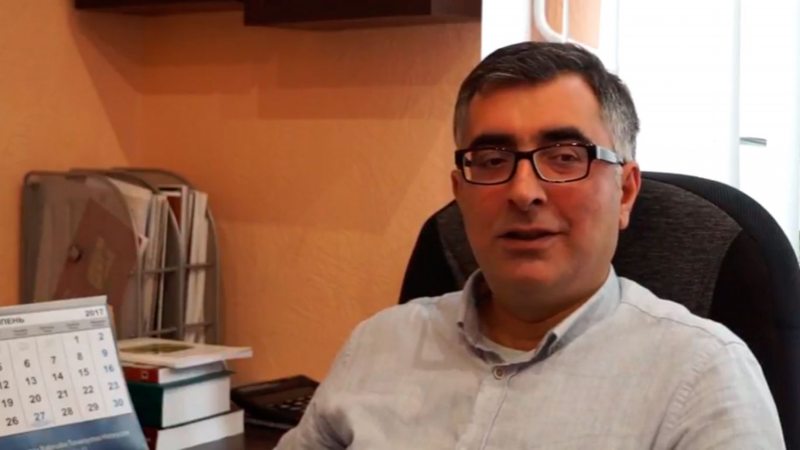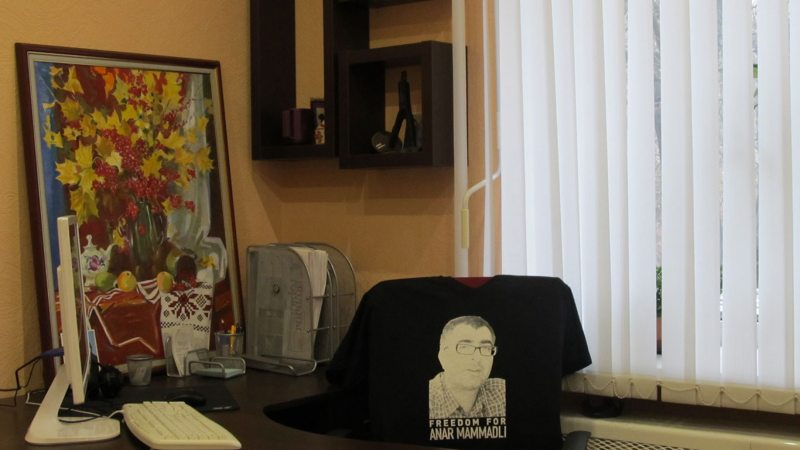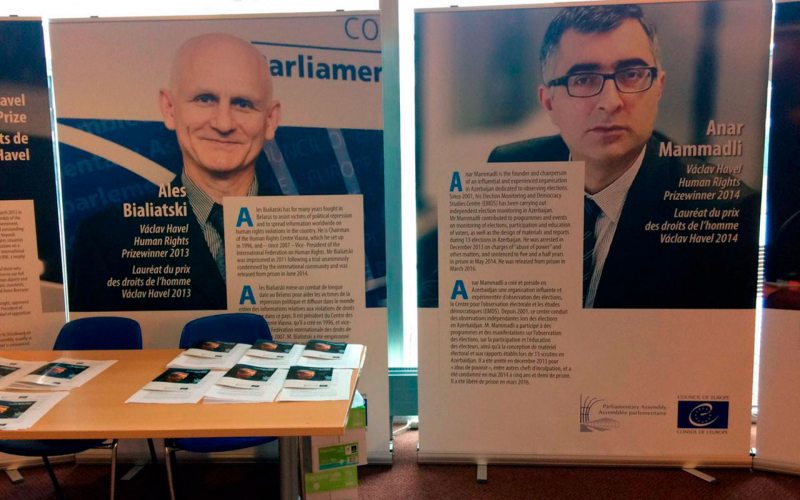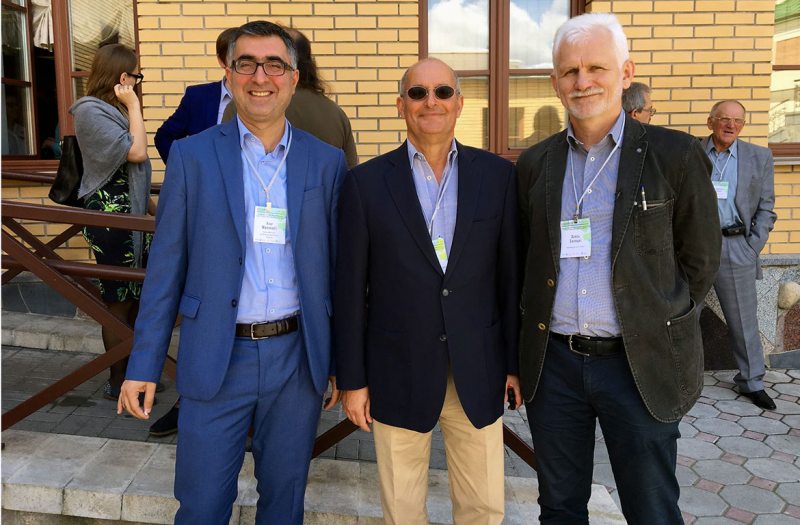Anar Mammadli: “While Belarusian government still wants to imitate democracy, in Azerbaijan it has already finished imitation”
Comparing the situation in Belarus and Azerbaijan, it can be noted that the authorities of both countries exchange experience of harassment of civil society activists. In particular, we periodically have to watch the waves of persecution of human rights defenders in the two ex-Soviet countries. The authorities even apply the same criminal charges: in 2011, Ales Bialiatski was convicted of ‘tax evasion’ in Belarus, and in 2014-2015 the charge was among the accusations against a number of authoritative human rights activists of Azerbaijan — Anar Mammadli, Leyla Yunus, and Intiqam Aliyev. Fortunately, today they are free. Unfortunately, their release does not mean an end to the politically motivated persecution of civil society activists, human rights defenders, and journalists in both countries.

- Azerbaijani human rights activist Anar Mammadli during an interview in Viasna’s office in Minsk. 6 July 2017
Anar Mammadli, a former political prisoner and head of the Election Monitoring and Democracy Studies Center, who spoke at the parallel Civil Society Forum in Minsk on July 4, described the current situation and the situation of human rights defenders in Azerbaijan.
- Firstly, I am grateful for the invitation. It is an honor to be in the office of Viasna. For my organization and some of our colleagues, human rights organizations in Azerbaijan, Viasna is a friend.
Right, our countries have much in common. Most importantly, the motive for repression is very similar. We hear news [from Belarus - Ed.] that they are harassing journalists, political leaders and activists, representatives of civil society. And in the past three years, much has worsened in Azerbaijan. But now, for example, in Belarus, I see that the government at least wants to imitate that it’s an OSCE member, trying to be a normal partner for the European Union and so on. In Azerbaijan, unfortunately, the government has already finished imitating the policy of democratization - despite the fact that the country is a member of the Council of Europe and [in May-November 2014 - Ed.] presided at the CoE’s Committee of Ministers. And now we have problems that can be observed in Belarus, too. The government's motive is to destroy alternative voices: organizations, journalists who criticize the government. At the moment, there are about 150 political prisoners in Azerbaijan. This is a huge number, I think that [by the number of political prisoners - Ed.] Azerbaijan is the second country after Turkey among the members of the Council of Europe. Among them are political leaders of different beliefs, there are journalists, many bloggers, members of the religious community, who also criticized the government for its socio-economic policy.

- A T-shirt with Anar Mammadli’s portrait used to campaign for his release during the activist’s imprisonment in 2013-2016
As for the human rights activists, yes - we have already been released. Some of my colleagues are now in foreign countries, in different European countries. They could not live in Azerbaijan due to the pressure exerted on them. Some, like Arif and Leyla Yunus, were forced to leave the country for medical reasons. Those who are still in Azerbaijan do not have opportunities for normal work. First, three years ago the government began to create new legislation, which deprives us of various opportunities. In particular, we cannot receive financial assistance from either national or foreign donors; in general, there are currently no organizations working with foreign donors. Many international organizations left Azerbaijan: the OSCE closed its office, there are no more missions of international humanitarian organizations. Then, there were new heavy sanctions against non-governmental organizations and civil society, which make it simply impossible for us to work. And most importantly, political thinking has changed 100% and the government considers all members of civil society to be enemies of the people, they use black PR against us, declare us spies - pro-Armenian or foreign - deploying the same campaign as we saw in Russia. It is psychologically impossible to work. It is impossible to have an official office, it is impossible to hold seminars, trainings, forums. Even if there is a financial opportunity to conduct an event in Baku or somewhere in the regions, you need to get permission from the presidential administration or the local executive authority for this.
Therefore, we have priority tasks. To protect people who are now in prison for political reasons is our priority. Secondly, we try to do our best to make international organizations more specific and serious about such states as Azerbaijan and Belarus. After all, it is impossible to talk with such authorities in a diplomatic tone. It is necessary to plan more concrete mechanisms for the protection of human rights in Azerbaijan, Belarus, Russia, Turkey. How long will they continue this imitation, being a member of the OSCE, the Council of Europe, assuming international obligations? It's time to put an end to this, and we are trying to work in this direction.

- Posters of Ales Bialiatski and Anar Mammadli, winners of the Vaclav Havel Human Rights Prize, displayed at the Council of Europe
Journalists and foreign colleagues often ask me what is most important for us in such situations. Of course, it is important for us to work with the citizens of Azerbaijan. Because the new generation knows little. Every day the dominant TV and newspapers are engaged in propaganda, as if Azerbaijan is a brilliant country, everything is super. They do not know the alternative. There is Facebook, social media, but that's not enough. We need to work with citizens, to inform them in detail about our problems, about existing alternatives. We need to explain why we need free and fair elections, how we can resolve our problems, why it is important to participate in the political life of the country. It's worth working on.
- Anar, you already mentioned the topic of elections. Your criminal case was related to the fact that your organization monitored the presidential election of 2013 and exposed multiple falsifications. Viasna, as you know, was punished for monitoring a presidential election and stripped of its registration, but continues to be engaged in election monitoring. The Election Monitoring and Democracy Studies Center also continues its activities. What election-related issues do observers in Azerbaijan face?
- There are many problems. First, the electoral legislation itself does not meet European standards. 10 or 15 years ago, the Venice Commission of the Council of Europe [European Commission for Democracy through Law - Advisory Body on Constitutional Law under CoE - Ed.] prepared a report with many suggestions and recommendations to amend our Electoral Code, which the government has ignored so far. And at the moment there is no political will to communicate with the Venice Commission. And, by the way, political will is the most important thing. The government lacks the will to hold normal elections. It is not inherent in their thinking that there are problems about the country’s electoral system and this needs to be corrected. In practice, they control all the media - and it's impossible to hear any alternative platforms on television that opposition parties offer, in the parliament there are no oppositionists at the moment - and it is impossible to hear criticism of President Ilham Aliyev or the prime minister. Although earlier we had this - because they imitated these things. But in recent years, as I said, ‘stop imitation’ – they began to ignore everything.
Concerning what we see in practice. There is no vote buying in Azerbaijan, which is common in some countries. Administrative resource is abused here: with the help of local executive authorities, groups of people are organized to vote two or three times on election day, and if there are too few ballots cast, then the protocols will be rigged and the necessary falsifications will be made. At the same time, the judicial system does not work. Azerbaijan is the leading country in terms of violations of electoral law in the statistics of the European Court of Human Rights. I know for sure about 26 decisions of the ECtHR on such complaints, and there are also many decisions about the parliamentary elections since 2005. These are complaints of violation of the electoral law by the CEC and the district election commissions, abuse of administrative resource, refusals to register candidates, falsification of election results. All this is written in the decisions of the ECtHR, but the implementation of these decisions again lacks political will.
A lot can be said. But, I think that the most important thing for the electoral system is the provision of fundamental rights to freedom of speech, freedom of assembly and freedom of association. Without this, it is impossible to hold free democratic elections, which is what is happening in Azerbaijan.
- What obstacles arise before participants of your monitoring network during election observation?
- The most difficult thing for us is to hold normal meetings with people who want to become observers. It is very important to explain to them what independent observation is, how to document violations, how to prepare a complaint to the election commissions. There are 125 electoral districts in Azerbaijan, and in every district there was an observer, we had to go to at least 20 regions. But, as I said, local executive authorities do not give permission to hold such meetings. It is impossible to go to certain regions at all, because it is immediately noticeable that you came from Baku, and then it’s not us who will have problems, but the participants of our events. And we would not like these meetings to have any consequences for the people, and we must take into account such circumstances. Also, for carrying out such events, we need financial resources that are difficult to obtain: we cannot attract foreign aid, and collecting donations for our activities within the country under the new laws has also become difficult, because everyone who, for some reason, gives money to non-governmental organizations, must fill in a certain form, send this information to the Ministry of Finance and the Ministry of Justice. And people are afraid to support such organizations as ours. Therefore, in such conditions, it is difficult for us to work on a full scale.
Well, when our observers come to polling stations, of course, they are not welcome there. Therefore, several years ago, our government resorted to a new tactic - they created GONGOs [nominally, non-governmental public associations working for the interests of the state - Ed.]. We have many such organizations, therefore one can see pro-governmental observers at each polling station. And if there are one or two observers from political parties and non-governmental organizations, then there will be a crowd of these pro-governmental people around them who will challenge every violation voiced by our observers. Of course, this creates psychological discomfort in our work.
Nevertheless, we observe, draw our conclusions. We have good experts who can sit down, analyze and present an alternative view on the election results. It is very important.
Right, by monitoring the elections, we do not influence the results. We are writing an alternative history. Let our new generations know that we tried to do something. The country is thus divided into virtual Azerbaijan, which the authorities are talking about, and real Azerbaijan, which we are talking about. Our task is to provide people with reliable information about the realities of social and political life. This is important.
The Civil Society Parallel Forum was held in Minsk on July 4, on the eve of the 26th Annual Session of the OSCE Parliamentary Assembly. It gathered more than 100 representatives of Belarusian and foreign organizations (FIDH, Human Rights House Foundation, Front Line Defenders, Amnesty International, etc.), guests from the OSCE PA, ODIHR and other OSCE structures and embassies in Minsk. The organizers of the Forum see it as their goal to strengthen the human dimension and avoid ignoring human rights issues in the face of new challenges in the OSCE region.


















